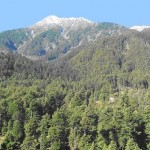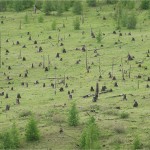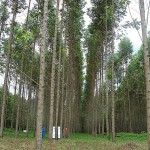A Rebirth for the Forests of Asia
Over-exploitation for wood and fuel, land conversion to agriculture, forest fire, expansion of desert areas, drought and illegal logging, in the past, were among the factors that have caused major degradation of Asia’s forests.
More recently, as awareness of the problems and excesses grew, efforts at rehabilitation began to emerge. Some of the rehabilitation successes started with government programs then spread to industry, non-government organizations and local communities.
The growing economies in Asia, home of 14% of the world’s forests and more than 60% of its population, create many challenges and opportunities – economically, environmentally and socially – for the forests, which play important roles in these countries.
Forest scientists from various regions in Asia, who have responded to this challenge through an initiative called Keep Asia Green, will be among those discussing at the 2010 IUFRO World Congress in Seoul the history, current status, success and failures of forest rehabilitation efforts in their countries.
“The Seoul discussions around Keep Asia Green – the lessons learned and success stories – will allow those from any part of the world confronted with the degradation of forests, to assess what approaches could be adopted and applied successfully to address the challenges they face at home”, says IUFRO President Professor Don K. Lee.
- Photo taken by R. Jasrotia
- Photo taken by J. Tsogtbaatar
- Photo taken by D. Lee
IUFRO and FAO: 60 years of collaboration at the XIII World Forestry Congress
The celebration of 60 years of the Memorandum of Understanding (MOU) between the International Union of Forest Research Organizations, IUFRO, and the United Nations’ Food and Agriculture Organization, FAO, took place in conjunction with the XIII World Forestry Congress in Buenos Aires, Argentina.
There has been long history of collaboration between IUFRO and FAO, which started with the signing of the MOU in 1949. FAO started working with International NGO’s shortly after its creation in the mid-1940s and at that time, it was even considered to incorporate IUFRO into FAO in order to formulate research aims more clearly, to avoid duplication of research projects, and to reduce costs.
While this consideration was not put into practice, in 1949 IUFRO worked out an agreement with the Forestry Department of FAO whereby IUFRO retained its independent status, but had a specialized consultative status with FAO. To this day, FAO has observer status on IUFRO’s Board (representation usually is through its Assistant Director General, in 2009, Jan Heino).
FAO and IUFRO are both committed to collaborate in some of the projects and programs with among others, the theme of forest education, forest terminology, and the role of science in national forest programs. Many IUFRO activities have been supported and until now are being assisted by FAO. For instance, IUFRO’s Special Program for Developing Countries (IUFRO-SPDC) was jointly established by IUFRO and FAO in 1983 and has since then served as a mechanism for research capacity development. Through IUFRO-SPDC, IUFRO provides assistance for the long-term development of the capacities of individual scientists and research institutions in developing countries. Together they have focused on the Forestry Research Network for Sub-Saharan Africa (FORNESSA).
During the last years, FAO and IUFRO have actively worked in the frame of the Collaborative Partnership on Forests (CPF). IUFRO as the leading organization of the Global Forest Information Service (GFIS) and the Global Forest Expert Panels (GFEP) highly appreciates the effort of FAO as chair organization of the CPF.
Please leave your comments on this article and to find out more information about IUFRO-FAO collaborations, we encourage you to visit IUFRO’s website.



